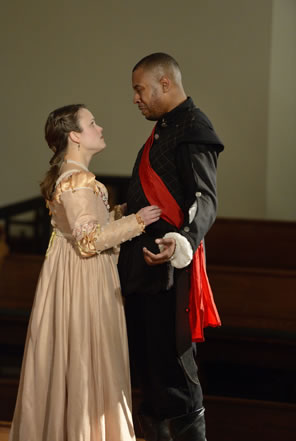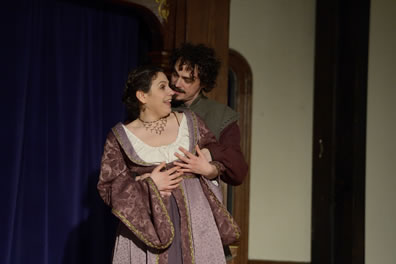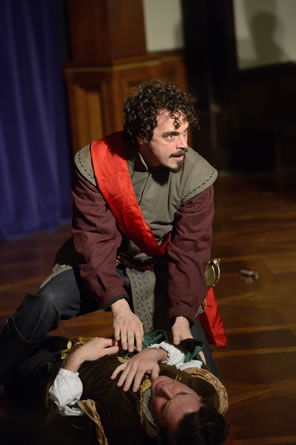Othello
'Tis Love, 'Tis True, 'Tis Pity, Too
Baltimore Shakespeare Factory, St. Mary's Community Center, Baltimore, Maryland
Saturday, April 21, 2018, front pew right
Directed by Tom Delise

Desdemona (Kathryn Zoerb, left) tries to appease Othello (Troy Jennings) in the Baltimore Shakespeare Factory production of William Shakespeare's Othello. Photo by Will Kirk, Baltimore Shakespeare Factory.
Let me point out right off the bat that this William Shakespeare play is called Othello—to be precise, The Tragedy of Othello, the Moor of Venice. As intriguing a character as the villain may be, it is not called The Comical History of Iago. As grounded as we have become in feminism, post-feminism, and #MeToo, it is not called The Most Lamentable Tragedy of Desdemona.
This play's heart and soul is Othello's fall into an emotionally wrenching psychological abyss. In the Baltimore Shakespeare Factory's Original Pronunciation production, Troy Jennings gives one of the truest portrayals I've seen of such an Othello. His is a tragedy so aching it elicits pity even in his most violent moments, for this Othello is an unwitting victim of another man's cold-hearted, self-indulgent cruelty, which Ian Blackwell Rogers' Iago slams home in the last seconds of the play.
Moments small and large with performances straight and true make this an Othello of singular excellence, with or without Original Pronunciation, representing a high benchmark for the Baltimore Shakespeare Factory (BSF) and its founding artistic director, Tom Delise, who helms this production. The company's modus operandi is to re-create the staging conditions of Shakespeare's time with text-centric thematic and character focus, a bare stage, universal lighting, audience interaction, fast pace, and no special effects, unless you count costumes (sumptuously Italian Renaissance as designed by Kendra Shapanus, though Othello exchanges his Venetian weeds for more traditional Arabian garb for the final scenes). This production takes the original production practices principle a significant step further by using Original Pronunciation, or OP, the English brogue used in Shakespeare's time and, more pointedly, heard by the playwright as he wrote his plays. With coaching from actor and OP practitioner Ben Crystal (son of English language scholar David Crystal, who did a couple of OP productions with the Shakespeare's Globe in London), BSF staged its first OP production, The Merchant of Venice, in 2015. The past three years the company has assigned one of each season's five plays as an OP production, each resulting in diminishing returns.
This season, Delise turned to Ann Turiano, a sometime actress with the company who has expertise with the International Phonetic Alphabet, to become a certified OP coach and train the cast from the first day of rehearsals. The result is fluidly consistent OP across the cast and throughout the play. Still, the measure of OP's success as a production element depends on individual reception: Some audience members say they understand the play better, others report that the lines are more difficult to follow. Though I enjoyed OP's revelations in Merchant, I fall into the latter camp with Othello. Two factors come into play in my assessment: One, I admit that my aural capacity is not what it once was; two, I am testifying to the thoroughness with which this cast speaks OP compared to those in previous productions. Comprehending good OP does require some work on the part of the audience, but it pays off with greater understanding of Shakespeare's verse structures, rhyming schemes, and puns (lewd gesturing not required).
In this instance, however, I am so emotionally engaged with the characters, I don't want to work; I just want to feel. This is one of the strongest casts I've seen in a BSF production of any pronunciation and Delise's most sure-handed direction. Perhaps the OP is part and parcel of that quality. The actors describe how OP forces them to speak in a lower register, drawing their emotions and even their character readings from the depth of their diaphragms. Jennings brings a muscular musicality to Othello's lines, which, in turn, makes more pronounced his underlying vulnerability that gushes through his authoritative visage.
The opening scene announces the potential of two truly signature performances with Iago and Roderigo. Rogers establishes an Iago of note with his casual, business-like demeanor and intelligence even as he proclaims his hatred for Othello to Roderigo. Despite the vile things he says, Rogers makes his Iago appealing as we laugh along. Terry O'Hara portrays Roderigo with great sympathy, gullible but not foolish, a testament to Iago's skills at gulling: The jump from scamming Roderigo by pretending to court Desdemona on his behalf to manipulating Othello into killing Desdemona is not a wide gulf—Iago is just so good at what he does.
As captivated as we are by Iago in that opening scene, when Jennings's Othello strolls on stage at the start of Scene Two, the play becomes his. He creates a commanding presence even before speaking. This is a young Othello, in his 20s, a sweet face with trimmed stubble of a beard, charm swimming in his eyes, and confidence in his easy smile, though a warrior in his stride and posture. First impressions are the foundation for a richly studied performance; remarkable, given that Jennings has little training in the classics. He made his Shakespeare debut as Octavius Caesar in last year's OP production of Antony and Cleopatra at BSF (which I did not see) and in this second outing proves himself an accomplished Shakespearean with Othello.
Jennings grounds his entire performance in one thing: Othello's great love for Desdemona and the now cringe-worthy line that he is "one that loved not wisely but too well." In his description of courting Desdemona, Jennings hits his OP stride while we, the audience, melt in a face that expresses his delight and astonishment that a woman of Desdemona's grace and place could love him. It is not Othello who used witchcraft as Desdemona's father Brabantio accuses, but Desdemona who had besotted Othello. "I think this tale would win my daughter too," says the Duke (Grayson Owen), echoing my own succumbing senses in this moment.
Jennings lands two other key line readings as Othello's story progresses. First is his comment after an encounter with Desdemona at the very moment Iago is about to go to work on him: "Perdition catch my soul, but I do love thee! And when I love thee not, chaos is come again." Jennings pauses and ponders chaos vividly in his mind's eye. Desdemona is an antidote for a man who not only has witnessed much horror as a warrior but also knows that much of that horror yet resides in him. While he knows no fear as a warrior, he displays great fear as a lover. "My mind misgives," he says after asking Desdemona to fetch the love token handkerchief that he knows, via Iago, she does not have. Misgive may mean a lot of things to different Othellos—suspicion, anger, accusation—but Jennings laces the word with its definition in Merriam Webster's Collegiate Dictionary Tenth Edition: "to be fearful or apprehensive." As he repeatedly demands the handkerchief, he does so with an increasing pitch of misgiving rather than rising fury, and rather than storm away in anger he flees in anguish, afraid that Desdemona doesn't love him anymore. (Jennings, masterful with the language and characterization, is a tremendous physical actor, too, as when he later becomes a shuddering ball of frustration leading to his epileptic seizure, every single muscle in his body seeming to writhe individually as he collapses on stage).
The thing is, Desdemona so loves him, she has no idea that she is the object of his distemper. This is my first experience of Jennings, but I've seen Kathryn Zoerb in several performances the past half-dozen years, and her astuteness has never been keener than it is with Desdemona. She plays her lines with no extra-textual or extra-contextual coating. She embraces the bravery of a young woman who stands up to her father and talks back to the Duke in a roomful of senators. She consciously makes a public display of confidence upon her arrival in Cyprus despite her worries for her over-tardy husband. She genuinely (if naively) believes she can and should vouch for Cassio (David Martin as a dashing socialite and the most exquisite OP practitioner in the cast) to reconcile him with Othello. Desdemona keeps trying to understand what exactly has driven Othello mad, and when he finally tells her, she's at a loss as to his reasoning and hopes truth will triumph.
One thing she certainly doesn't anticipate is to be murdered. Zoerb has grabbed hold of a single line in Desdemona's description of the maid Barbary who taught her the "Willow" song. "She was in love, and he she loved proved mad and did forsake her," Desdemona says, then describes how Barbary died singing the song. Barbary was not killed; she was forsaken, and that is the fear Desdemona has—that Othello will forsake her—inspiring her to sing that song about a forsaken love herself. When she discovers that Othello intends to kill her, she embraces the option of being forsaken: "Banish me, my lord, but kill me not!" Then she tries to buy time for truth: "Kill me tomorrow: let me live tonight!" "But half an hour!" "But while I say one prayer!" Out of time, she fights him, flailing, kicking, punching—I don't know if the two actors do a fight call for this battle royal on the bed, but Jennings no doubt comes away with a few bruises to show for Zoerb's performance.
This production features another great love: that of Iago and his wife, Emilia, played by Jess Behar with a charming, down-to-earth manner. This is my 14th stage production of Othello and the first that eschews a dysfunctional marriage for a perfectly functional one. Iago assists his wife onto the platform when they arrive in Cyprus, they cuddle, they affectionately jest, and, most importantly, they exchange behind-the-back glanced communications that prompt Iago to intervene on behalf of Desdemona, which plays right into his hands. Adoration for her husband and a bit of simple guilt-ridden pride explains why Emilia turns Desdemona's lost handkerchief over to Iago and then doesn't reveal it until the end, when it's too late. That it does come too late is brought home by how Behar plays one line—"My husband?"—that Shakespeare has Emilia repeat four times when Othello says Iago told him of Desdemona's affair with Cassio. Incredulity comes up short as a description for Bassio playing Emilia's reaction to the notion that her husband would do such a thing, Othello's revelation of the handkerchief's role is such a shock to her—and what she on the sudden learns what her husband is—that she's willing to die.
That Iago can so fool Roderigo, Cassio, Othello, Desdemona, and his own wife (not a far-fetched notion, by the way, especially in a military environment) places quite a demand on the actor playing the role. Rogers is a longtime fave of mine, but with this and his previous outing as Menenius in the Brave Spirits production of Coriolanus, he has reached an ascendant tier of acting. His Iago is a study in stoic intelligence, constantly observing and processing every comment, expression, gesture, and manner in every individual around him. Shakespeare clues us in to this skill with the first Cyprus scene in which Iago uses asides to the audience to describe Cassio interacting with Desdemona and how he can manipulate his observations: "He takes her by the palm: ay, well said, whisper: with as little a web as this will I ensnare as great a fly as Cassio." Rogers takes this passage as his director's notes for every scene he's in thereafter—except that such asides are acted through his eyes instead of actually speaking.


Above, Iago (Ian Blackwell Rogers) cuddles with his wife Emilia (Jess Behar) in the Baltimore Shakespeare Factory production of William Shakespeare's Othello. In their happy marriage, Emilia is clueless to the true nature of her husband, who gulls and kills their friend, Roderigo (Terry O'Hara), right. Photos by Will Kirk, Baltimore Shakespeare Factory,
Notably, as Iago is commenting on Cassio interacting with Desdemona upon arriving in Cyprus, Roderigo is chatting with Emilia. But of course! Why wouldn't they know each other, since Iago has gone to great lengths to establish his faux friendship with Roderigo? This is one example of Delise's overall insightful handling of the play, from contextual matters, such as the Iago-Emilia marital state and maintaining the scenes with the Clown (Micaela Mannix, who also plays Cassio's hotheaded girlfriend Bianca), to simple blocking and gestures, such as Desdemona dropping her handkerchief as she and Othello exit through the audience, making the patron who hands it to Emilia complicit.
Delise positions the actors to illustrate the gaps between public sentiment and internal intent. As Iago stands at the front of the stage quizzing Othello behind him, we see Iago's calculating eyes that Othello can't see. They then switch positions as Iago's roundabout suggestions take hold on Othello; his back to Iago, Othello is ostensibly reading his papers but showing us subtle signs of consternation building in his psyche. Of course, Iago can judge Othello's body language well enough (tellingly, Iago never actually spots Roderigo when he greets his arrival on stage; Iago just knows he's there). Desdemona and Othello are similarly placed as he's grilling her about the handkerchief: We can see, but he cannot, Zoerb's face passing through expressions of guilt, worry, irritation, and back to confidence in her belief that their strong love will get them through this their first rough patch.
Subtle staging emphasizes the importance of military rank in Iago's motivation, as Othello promoted Cassio rather than Iago, his longtime ensign, to be his lieutenant. When the Duke commands Othello to "leave some officer behind, and he shall our commission bring to you," Cassio steps forward and thrusts out his red-sashed chest like a peacock his feathers while Iago glares at him from behind. However, Othello calls on Iago, "A man he is of honesty and trust," to carry the commission and escort his wife to Cyprus. As Cassio looks surprised, Iago steps up with just the slightest of smirks—can't be too obvious in his distaste toward the lieutenant. Another bit of stage business I love, whatever meaning it may carry, comes after Cassio has stabbed Cyprus captain Montano (Conrad Deitrick) in the brawl during the victory celebration: Cassio wipes the blood off his sword with his red lieutenant's sash. His brawling leads to Cassio's cashiering by Othello, and after the general has bestowed the lieutenancy on Iago, Cassio can't help fingering the sash Iago now is wearing.
Delise's blocking keeps Iago in view of the audience without upstaging the scene's focus. That would be a Herculean effort if not for Jennings' performance. I grant that you might not be able to take your eyes off Othello whenever he's on stage (or Martin's genuinely funny Cassio or Zoerb's heroic Desdemona), so see this production twice, the second time watching Iago watching them. And then weep when Zoerb's Desdemona gets on her knees before Iago to express the depth of her love for Othello; that this doesn't move Iago to pity reveals just how psychopathically opaque Rogers plays him. Only once does his true nature surface, and that comes after the play's last line is spoken. Iago, being led out, stops at the head of the bed and looks down at the corpses of Othello, Desdemona, and Emilia. His head bowed, he stares a couple moments then lifts his head, revealing to the audience a face bearing an accomplished grin.
Eric Minton
April 27, 2018
Comment: e-mail [email protected]
Start a discussion in the Bardroom




 Find additional Shakespeareances
Find additional Shakespeareances